|
|
|
Sort Order |
|
|
|
Items / Page
|
|
|
|
|
|
|
| Srl | Item |
| 1 |
ID:
106612
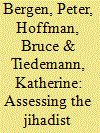

|
|
|
|
|
| Publication |
2011.
|
| Summary/Abstract |
Al Qaeda and allied groups continue to pose a threat to the United States. Although it is less severe than the catastrophic proportions of a 9/11-like attack, the threat today is more complex and more diverse than at any time over the past nine years. Al Qaeda or its allies continue to have the capacity to kill dozens, or even hundreds, of Americans in a single attack. A key shift in the past couple of years is the increasingly prominent role in planning and operations that U.S. citizens and residents have played in the leadership of Al Qaeda and aligned groups, and the higher numbers of Americans attaching themselves to these groups. Another development is the increasing diversification of the types of U.S.-based jihadist militants, and the groups with which those militants have affiliated. Indeed, these jihadists do not fit any particular ethnic, economic, educational, or social profile. Al Qaeda's ideological influence on other jihadist groups is on the rise in South Asia and has continued to extend into countries like Yemen and Somalia; Al Qaeda's top leaders are still at large, and American overreactions to even unsuccessful terrorist attacks arguably have played, however inadvertently, into the hands of the jihadists. Working against Al Qaeda and allied groups are the ramped-up campaign of drone attacks in Pakistan, increasingly negative Pakistani attitudes and actions against the militants based on their territory, which are mirrored by increasingly hostile attitudes toward Al Qaeda and allied groups in the Muslim world in general, and the fact that erstwhile militant allies have now also turned against Al Qaeda. This article is based on interviews with a wide range of senior U.S. counterterrorism officials at both the federal and local levels, and embracing the policy, intelligence, and law enforcement communities, supplemented by the authors' own research.
|
|
|
|
|
|
|
|
|
|
|
|
|
|
|
|
| 2 |
ID:
116165
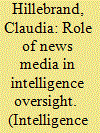

|
|
|
|
|
| Publication |
2012.
|
| Summary/Abstract |
This article explores the role of the news media in overseeing intelligence services and their work. As an informal mechanism, how do they fit into the wider landscape of intelligence oversight? By drawing on examples of US counter-terrorism efforts in the post-9/11 era, the article identifies three roles for the news media in intelligence oversight: as an information transmitter and stimulator for formal scrutinizers, as a substitute watchdog and as a legitimizing institution. Yet there is a danger of the news media acting merely as a lapdog. Other limitations include the impact of regulatory frameworks, government secrecy and the media strategies of intelligence services. The article concludes that the news media play an important role in the wider intelligence oversight landscape, but that their ability to scrutinize is uneven and ad hoc and as a result the picture they produce is blurred.
|
|
|
|
|
|
|
|
|
|
|
|
|
|
|
|
| 3 |
ID:
172870
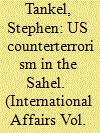

|
|
|
|
|
| Summary/Abstract |
The massive expansion and evolution of United States security cooperation under the auspices of the ‘war on terror’ remains overlooked in the counterterrorism and interventions literature. The Sahel provides a useful region in which to explore the constitutive effects of such cooperation and its evolution because the US has always pursued an ‘economy of force’ mission there. In this article, I focus mainly on the constitutive effects of US indirect military intervention in the Sahel after 9/11, and subsequent more direct military intervention following the outbreak of civil war in Mali. The indirect intervention by the United States to build the capacity of local forces in Mali, where jihadists were based, failed because of the dissonant relationship between the two countries. This led the United States to intervene more directly in the region, including through its cooperation with and support for French and Nigerien forces. The nature of this more direct military intervention was also informed by evolving US experiences working by, with and through partner forces in other parts of the world.
|
|
|
|
|
|
|
|
|
|
|
|
|
|
|
|
| 4 |
ID:
151103
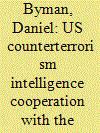

|
|
|
|
|
| Summary/Abstract |
The US struggle against global terrorist groups depends heavily on intelligence cooperation, particularly with developing world countries that are autocratic. This dependence creates many problems. Autocratic allies often have politicized security institutions to prevent a coup and maintain the regime in power. Services will be reluctant to cooperate on areas of high regime sensitivity. Internal communication and information sharing is poor, and security services are often pitted against one another. In addition, the regimes often lack democratic legitimacy, corruption flourishes by design, and many senior leaders are chosen for loyalty, not competence. American influence will be limited, and at times providing fewer resources may gain more influence than providing more assistance.
|
|
|
|
|
|
|
|
|
|
|
|
|
|
|
|
| 5 |
ID:
120801
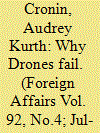

|
|
|
|
|
| Publication |
2013.
|
| Summary/Abstract |
Drones are not helping to defeat al Qaeda and may be creating sworn enemies out of a sea of local insurgents. Embracing them as the centerpiece of U.S. counterterrorism would be a mistake.
|
|
|
|
|
|
|
|
|
|
|
|
|
|
|
|
|
|
|
|
|